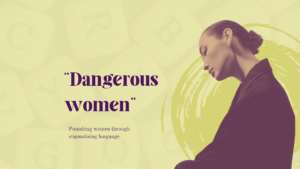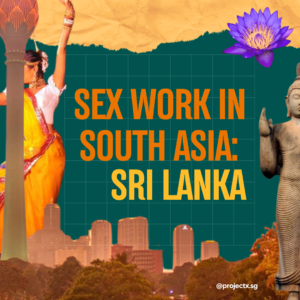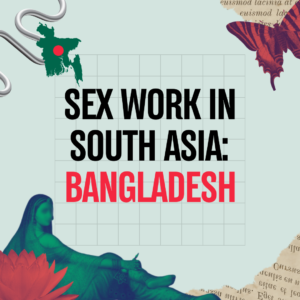Preface
This is the ninth post in Project X’s new series Sex Work in ASEAN Nations – a series designed to encourage greater understanding of and dispel common myths about sex work in the region. This series will consider the state of the sex industry and sex workers’ rights in each of the 10 ASEAN countries. It will consider the unique historical, cultural, political, and economic circumstances of that country, as well as why the decriminalisation of the industry is crucial for the region’s economic and political development.
A Brief History of Sex Work in Brunei Darussalam
The history of Brunei is often shrouded in mystery, much less the history of sex work in Brunei.
Law, Policy, Policing
The legality of sex work in Brunei has always been absolute. Despite the British’s interventionist focus on the Sultanate’s defence and foreign affairs, Brunei’s legal system is still based on British Common Laws, which outlaws sex work. Many of these laws are similar to those in Singapore.
Laws concerning sex work in Brunei and notable cases
Under Brunei’s constitution in 1959, the Sultan of Brunei was given possession of statewide legislative powers, in addition, due to a rebellion in 1962, a State of Emergency was declared over Brunei, giving the Sultan powers to pass any form of legislation he deemed fit without the need for judicial review. Up till today, Brunei is under martial law, with the Sultan in full power as head of state and government. (“Southeast Asian Region Countries Law: Brunei Darussalam”, 2023)
On 30 April 2014, Sultan Hassanal Bolkiah announced that Shariah Penal Law would become effective in phases, starting from 1 May 2014. Brunei thus became the first country in SEA to adopt the Shariah Penal Code. Using a three-phase implementation process that was completed in 2019, Brunei slowly criminalised sex between men (Liwat), illicit sexual intercourse (Zina), abandonment of Islam (Irtidad) and rape (Zina bil Jabar), while simultaneously introducing capital punishment as a form of “deterrence”. (IANS, 2019)) People who were prosecuted under Shariah law could face stoning to death for illicit sexual relations and the amputation of limbs for theft.
While these laws are typically meant to criminalise the general population and their foreign partners who engage in these actions, Shariah laws can be used to criminalise female and transgender sex workers. Furthermore, liwat (sex between men) and men posing as women are illegal in Brunei. These laws criminalise both gender identity and sex work for transgender sex workers, making it difficult for them to access sexual health services and HIV prevention programmes that target MSMs (Men who have sex with men) and transgender people. (Junaidi, 2012)
Furthermore, the Royal Brunei Police Force also re-established its Village Neighbourhood Watch in 2014 to step up efforts in community policing, which may encourage reporting against sex workers. The police also encourages members of the community to report details to their hotline as a feature of their efforts to step up crime prevention. Hence, for those avoiding detection, sex work becomes difficult to carry out. (Kon, 2022)
Sex Worker Statistics & Their Economic Impact
Little is known about the general statistics on sexual health services and sex work in Brunei, due to the government’s refusal in reporting any relevant statistics. Ironically, what can be found on the internet or media are the details on the sex controversies that have surrounded the Royal family of Brunei since the 1990s. While the Sultan of Brunei and his brother have been infamous for their extravagant lifestyle, it was only in 1997 that information on their lifestyles came to light.
Shannon Marketic, a former Miss USA sued the Sultan’s brother Prince Jefri alleging that she had been tricked and held captive alongside other women in Brunei to participate in sex parties. (Gadsden Times Associated Press, 1997) However, after Prince Jefri denied all allegations, (The Free-Lance Star, 1997) the suit was subsequently dismissed as the Bruenian royalty claimed sovereign immunity.
Furthermore, in 2010, Jillian Lauren released an autobiographical account on her experiences as a paid entertainer in Prince Jefri’s harem, Some Girls: My Life in a Harem. Most of the women in the harem were hired on short-term contracts that lasted around three weeks, and were paid around US$20,000 weekly, and were given jewellery as additional gifts. These women ranged from different nationalities, most of them were Filipino or Thai and some were alleged to be as young as 15. It is also reported that the Prince never used protection, and sexual health testing was never a concern within the harem.
Bruneian Culture, Religion, and Social Norms
As of 2021, 81.2% of Brunei’s population are Muslims. (Ministry of Finance and Economy Brunei, 2022) According to the teachings in Islam, sex before marriage is considered immoral and a sinful act. Cultural values on purity and keeping one’s virginity also hold heavy weight in Brunei. Brunei’s push for a stricter observance of Islamic precepts since 1990 (BBC, 2019) has led to laws that prohibit the sale and consumption of alcohol within Brunei and other forms of “western” vices such as gambling. Thus any forms of reproach or creation of a red-light zone by lawmaker Goh King Chin were subsequently shot down by Religious Affairs Minister Zain Serudin, a testament to the now institutionalised stigma Brunei had towards sex work and alcohol. (The Canadian Press, 2010) Brunei’s heavy prohibition of sex work can provide a strong foundation for community attitude and encourage stigmatisation of sex workers.
The Hope for Law Reform
“Everyone is affected. It’s just going to be a horrible life living there, even if you’re not LGBT. Women especially would be at a big disadvantage there.”
According to personal opinions from the LGTBQ community, many believe that the harshest punishments under Shariah law (stoning) will not be enforced, and that their human rights have not been violated yet. (BBC, 2019) However, some Bruneians have have expressed their fear at what the move signals for the nation’s future stance, and considered fleeing the country. (Wright & Field, 2019) Zain, a young Bruneian transgender woman interviewed by CNA, said,
It is important to note that the harsh tone of the law sets precedence for growing homophobia and discrimination towards all sex workers in an already heavily conservative country.
The voices of sex workers are missing from this piece. While undertaking research for this piece, we were unable to find any sex worker organisation nor any interviews with sex workers. Perhaps there is a language barrier, but perhaps this is testament to the environment within Brunei that makes it impossible for sex workers to speak up or organise. We can only hope that sex workers in Brunei are safe, and they have access to the resources they need.
References:
- Brunei country profile. (2023, February 24). BBC. https://www.bbc.com/news/world-asia-pacific-12990058
- Brunei nixes ‘alcohol zone’ for non-Muslim visitors, says gambling, prostitution would follow. (2010, March 23). The Canadian Press. https://www.proquest.com/docview/346675173?parentSessionId=uNgy0u9Hxq5LE2r%2BIIU7CmehJ1MFJZxW4OvzW3HO%2BSY%3D&pq-origsite=summon
- Brunei says controversial Sharia law aimed at ‘prevention’. (2019, April 12). BBC. https://www.bbc.com/news/world-asia-47906070
- Former Miss USA wants court to have jurisdiction over Brunei Prince. (1997, December 17). Gadsden Times,19.
- Gruskin, S. (2014). Realigning government action with public health evidence: the legal and policy environment affecting sex work and HIV in Asia. Culture, Health & Sexuality, 16(1), 14-29. https://www-jstor-org.libproxy1.nus.edu.sg/stable/pdf/24741253.pdf?refreqid=excelsior%3A04fd3e237eccb641d1344d5c2dc58f5a&ab_segments=&origin=&initiator=&acceptTC=1
- IANS. (2019, April 12). Brunei: controversial sharia law aimed at “prevention.” Business Standard. Retrieved February 29, 2024, from https://www.business-standard.com/article/news-ians/brunei-controversial-sharia-law-aimed-at-prevention-119041200794_1.html.
- Inside the silent nation of Brunei. (2019, May 10). BBC. https://www.bbc.com/news/world-asia-48211193
- Junaidi, A. F. (2012). Brunei Darussalam Report NCPI. https://www.unaids.org/sites/default/files/country/documents/Brunei%20Darussalam%20NCPI%202012.pdf
- Kon, J. (2022a, July 15). Maintaining Peace and Security. Retrieved March 1, 2024, from https://borneobulletin.com.bn/maintaining-peace-and-security/.
- Kon, J. (2022b, October 20). Two foreigners held for offering sexual services. Borneo Bulletin. Retrieved February 29, 2024, from https://borneobulletin.com.bn/two-foreigners-held-for-offering-sexual-services-2/.
- Kon, J. (2022b, October 20). Two foreigners held for offering sexual services. Borneo Bulletin. Retrieved February 29, 2024, from https://borneobulletin.com.bn/two-foreigners-held-for-offering-sexual-services-2/.
- Laws of Brunei Chapter 120 Women and Girls Protection. (1984).
- Laws of Brunei Chapter 22 Penal Code. (2001). https://www.agc.gov.bn/AGC%20Images/LOB/pdf/Cap22.pdf
- Library Guides: Southeast Asian Region Countries Law: Brunei Darussalam. (2023, July 13). Brunei Darussalam. Retrieved July 24, 2023, from https://unimelb.libguides.com/c.php?g=930183&p=6721965
- The Population and Housing Census Report (BPP) 2021: Demographic, Household and Housing Characteristics. (2022). https://deps.mofe.gov.bn/DEPD%20Documents%20Library/DOS/POP/2022/RPT.pdf
- PUBLIC PROSECUTOR v. CLYDEELN H. ZACAL (D1) FRANCIS VIBAN BAYONG (D2). (2017). https://www.judiciary.gov.bn/High%20Court%20Document%20Library/HCCT-13of2015.pdf
- Sultan denies he kept girl as slave. (1997, March 5). The Free Lance-Star, 3.
- Tagliacozzo, E. (2008). Morphological shifts in Southeast Asian prostitution: the long twentieth century. Journal of Global History, 3(2), 251-273. https://www-cambridge-org.libproxy1.nus.edu.sg/core/journals/journal-of-global-history/article/morphological-shifts-in-southeast-asian-prostitution-the-long-twentieth-century/813E44E3A07404E8AAD252D507BB72EE
- Wright, R., & Field, A. (2019, April 3). Brunei’s lgbt community flees ‘inhumane’ new stoning laws. CNN. Retrieved February 2024, from https://edition.cnn.com/2019/04/02/asia/brunei-lgbt-inhumane-stoning-laws-intl/index.html.






